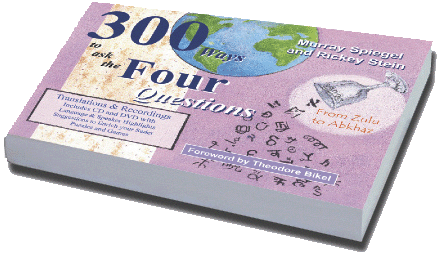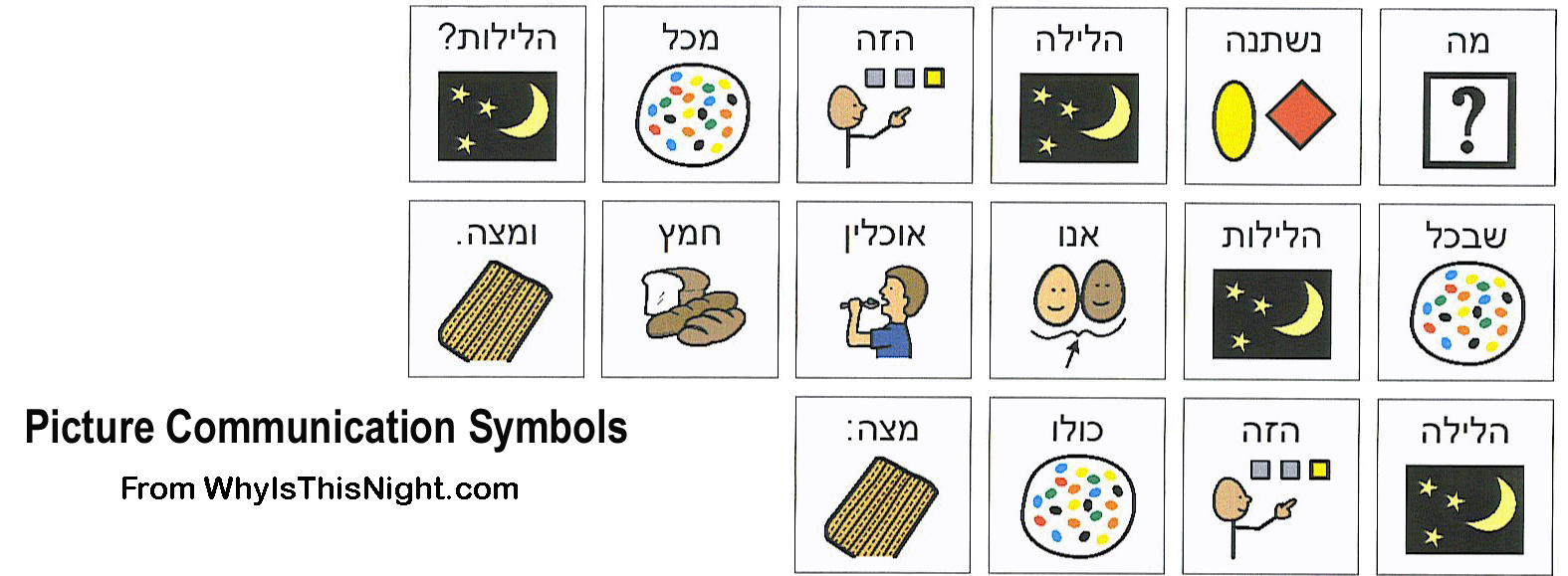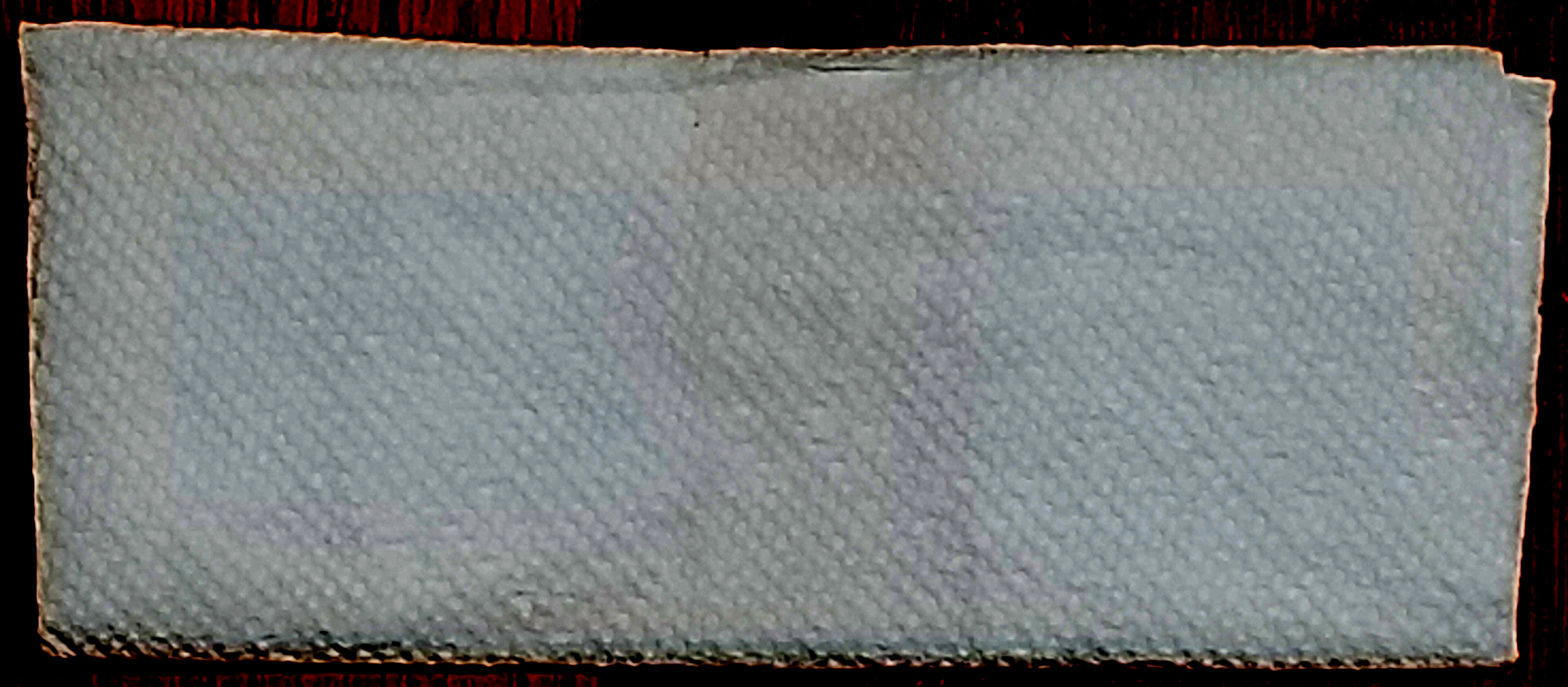
Parody Contest!
Create some great parodies of the Four Questions. Send them to us and we'll post the good ones!
Best Four Questions Parodies
(Show Tune Parodies near bottom)
Why -- Do I ask thee? Let me count the queries.
I ask thee of the length and width and height [1]
Of a crumbly, flakey matzo slice;
I ask thee of the bitterness of herbs
Ingested, swallowed in a trice.
I ask thee of the fashion put to use [2]
By brine and mortar dipped in twice;
I ask thee of leaning and idle grace [3]
In reclining, feeling rather nice.
Smiles, tears, of all my life! - and, if I choose,
I shall but ask again being more precise.
1. Original: had the depth and breadth and height.
Of course, for Passover we must not refer to breadth!
2. Original: passion put to use
3. Original: Ideal Grace
By: Efrat Tsur, Elyakim, Israel Ma Nishtana as Do (Dough) Re Mi (From The Sound of Music): RUNNER UP!
Dough, sans yeast, is matzo dough,
Rare, just baked one week per year;
Me, I go for bitter herbs,
Far preferred to other greens;
So, we'll dip and dip again,
Largely representing tears;
Teach the kids to dine 'n' lean,
Don't sit straight 'cause we're not sla-a-a-ves!
By: Yasmin Geva; Jerusalem
The Four Questions as a Limerick:
The matza, the herbs, double dipping,We lean to the left, nearly tipping.
What's all of this for?
By Martin Eiger (Limerick Laureate, Annals of Improbable Research); Montville, NJ
Ma Nishtana in Haiku:
MATZAH
Flat, tasteless matzah
In Nissan we remember
Our parents were free
BITTER HERBS
So acrid and sharp
The pain of our servitude
Herbs green and bitter
DIPPING
We dip and recall
Many tears of long ago
Twice on Chag Matzah
LEANING
We lean and relax
Gone are the chains of Pharaoh
People free at last
CEREMONY
With our family close
A ceremony special
Just days of freedom
(Bonus) THE THEME OF THE SEDER
Tradition awaits
Liberation is now here
Let's teach our children
By: Rickey Stein; North Brunswick, NJ
The Four Questions in Lolcat: (Reference: Wikipedia description of Lolcats) Wikipedia description of Lolcats)
Teh For KweschunsWai dis nitez diffrent frum awl udder nitez?
Wai awl teh udder nitez we noms cheezburger onna bun or wifs mazzahs,
but on dis nitez we noms cheezburgers only wifs mazzahs?
Wai awl teh udder nitez we noms awl kindz uf herbs,
but on dis nitez we noms owny bittr herbs dat maeks us barfs on teh floor?
Wai awl teh udder nitez we noms herbs wif no dippin, not eben wunce,
but on dis nitez we dips teh herbs an dips em agin?
Wai awl teh udder nitez we noms standin oar sittin oar layin on teh floor,
but on dis nitez we owny noms layin on teh floor?
By: Stacey Greenstein; Lake Hopatkong, NJ Another Lolcat version was created by Gerald Zuckier
Ma Nishtana in Java Programming Language:
FourQuestions.Java:import com.whyisthis.Night;
import com.whyisthis.Bread;
import com.whyisthis.Greens;
class FourQuestions {
public static void main(String[] args) {
Night thisNight, allOtherNights;
thisNight = getNight(Night.PASSOVER);
allOtherNights = getNight(Night.NOT_PASSOVER);
System.out.println("How is "+thisNight.getName()+" different from "+all OtherNights.getName()+" ?\n");
...
javac *.java com/whyisthis/*.java
java FourQuestions
Java is a portable programming language developed by James Gosling in 1995. It probably can be said that, at the time of book's publishing, much of the web runs Java.
By: Steven Weinberger; Brooklyn, NY
The Four Questions in Java Script:
////////////////////
//
// Four Questions Script by Moshe Berman of Bermania Productions
// www.mosheberman.com
// NYC, USA
//
///////////////////
//initialize the variables
var totalQuestions = 4;
var thisQuestion = 0;
var verb1, verb2;
//read the questions
// stanza by stanza
function readStanza(){
function readStanza(){
switch(thisQuestion)
case 1:
verb1 = "eat 'chametz' or 'matza'";
verb2 = "only eat matza.";
ask();
break;
case 2:
verb1 = "eat all kinds of herbs'";
verb2 = "only eat bitter herbs.";
ask();
break;
case 3:
verb1 = "dip as many or as few times as we want'";
verb2 = "dip exactly once.";
ask();
case 4:
verb1 = "sit or recline'";
verb2 = "only only recline".
ask();
break;
default:
//check for bugs. (In the lettuce, NOT in the soup!)
break;
}
//now ask them aloud and then go on to the next one
function ask(){
document.write("Why is this night different than all other
nights?");
document.write("On all other nights we " + verb1 + ", but tonight we only "
+ verb2 + ".");
//go to the next question
thisQuestion++;
//prepare the next question for reading
readStanza();
}
the Java programming language.
By: Moshe Berman; New York, NY
The Four Questions in PCS (Picture Communication Symbols):

PCS is a method of Augmentative and Alternative Communication used by people with severe communication disorders. Many individuals communicate using PCS: children with developmental language disorders and people with cerebral palsy, physical disabilities and other conditions resulting in loss of speech. Developed by Mayer-Johnson, PCS has been translated into several dozen languages. They are the most widely used symbols for Augmentative and Alternative Communication.
By: Lynn Kra-Oz; Ra'anana, Israel
Ma Nishtana in SQL (Structured Query Language):
SELECT Tonight.item,
FROM Othernights
JOIN Tonight ON (Tonight.Item = Othernights.Item)
WHERE Othernights.Description <>Tonight.Description
Rows returned: 4
| Item | All_Other_Nights | This_Night |
| ================ | ================== | ======== |
| Eat | Chametz and Matzah | Matzah |
| Herbs | Any | Maror |
| Dip | Null | 2 |
| Recline | Maybe | Always |
SQL is a standard programming language for querying and managing databases. Some people pronounce SQL as "sequel."
By: Cantor Stuart Binder, Congregation Beth Chaim; Robbinsville, NJ
Ma Nishtana in SMS messaging / Twitter / Tweet:
YYYY THS NITE DIFRNT FRM AL OTHR NITES 7Y DUWE ET ONLY MATSA 7
Y ONLI BTR ERBS 7
Y DIP X2 7
Y ET LEENING 7
CUZ . :-)
By: Ruthie Ben-Mayor; Kibbutz Ein-Shemer, Israel
The Four Questions in Wikipedia Version:
At the Seder, the youngest child asks the following: [citation needed]The following paragraph may contain original research and should either have citations added or be removed:
Why is this night different from all other nights of the year?
The following section may violate Wikipedia's Neutral Point of View Policy:
Why is it that on all other nights we eat bread or matza, but on this night we only eat matza?
Etc.
By: Gregory Koch; Poughkeepsie, NY
Show Tune Parodies
The Four Questions in Gilbert and Sullivan mini-operettas:
The "Why" Question (Tune of "If You Give Me Your Attention" from Princess Ida)They will give me their attention, they will turn to me and gape.
They'll put down their Manishevitz, I'll put down my Welch's grape....
The "Matzoh" Question (Tune of "Spurn Not the Nobly Born" from Iolanthe)
Most bread is doughy. Yet you must be realizing
This evening, though, we dine on bread that's done no rising ...
The "Bitter Herbs" Question (Tune of "My Eyes are Fully Opened" from Ruddigore)
The herbs we eat on other nights are many and are varied
The same meal may be cilantroed that has also been rosemaried ...
The "Dipping" Question (Tune of "I Cannot Tell What this Love May Be" from Patience)
I cannot tell why these double dips. We don't even have potato chips.
And dipping two times, or even one, is not my idea of fun ...
The "Leaning" Question (Tune of "When I Was a Lad" from HMS Pinafore)
On all other nights I sit up straight
With my feet perpendic'lar to my dinner plate ...
The "Special Ceremony" Question (Tune of "Here's a How-De-Do" from The Mikado)
Why the big to-do? Why such ballyhoo, ceremony, fuss, and bother, when all other nights are rather typical?
So, nu? Why the big to-do? ...
GET THE FULL OPERETTA HERE
By: Karen Cantor; Berkeley Heights, NJ
Ma Nishtana in the tune of "I'd Do Anything" (from Oliver!):
See a whole seder (!!!) based on Oliver! containing Robyn Shoulson's parody songs on our Seders For You site.See a whole seder (!!!) based on Oliver! containing Robyn Shoulson's parody songs on our Seders For You site.
Why, on Seder night
Are things just not quite right?
The changes are just slight
This night.
It seems the things we always do
Are just a bit askew
And they don't quite ring true
Tonight.
Every night we eat lots of bread,
But tonight it's Matzah instead.

And the vegetables we are fed
Now are bitter herbs - which we all dread!
Why, on Seder night
Are things just not quite right?
The changes are just slight
This night.
It seems the things we always do
Are just a bit askew
And they don't quite ring true
Tonight.
We're not used to dip when we dine.
Now we dip two times - once in brine.
Every night we sit up just fine,
But tonight we all ... have to recline!
Why, on Seder night
Are things just not quite right?
The changes are just slight
This night.
It seems the things we always do
Are just a bit askew
So tell me why we do
So much new - Tonight?
By: Robyn Shoulson; W Orange, NJ
© 2009 by Robyn Shoulson. Permission is hereby granted to reproduce this material in any non-profit medium provided that its content is not altered and this notice is appended.
Ma Nishtana in the tune of "The street where you live" (from My Fair Lady)
See a whole seder (!!!) based on My Fair Lady containing Robyn Shoulson's parody songs on our Seders For You site.See a whole seder (!!!) based on My Fair Lady containing Robyn Shoulson's parody songs on our Seders For You site.
I have often sat for a meal before,
But there's something here tonight I didn't feel before,
And so what has changed
That it feels so strange?
What makes this meal so different tonight?
Where're the fluffy rolls that I like to eat,
That I always like to dip in gravy with the meat?
Now there's Matza flat,
Dry and crumbly. That's
Just one way this meal's different tonight.
And oh! Those wonderful greens plates
Steamed, sauted, or frittered or plain.
Tonight, we remember our mean state,
We eat bitter herbs horseradish or romaine.
We have dips tonight not the salsa kind.
And we're sitting at an angle (not on our behind).
These are only four,
And I'm sure there's more
Things so strange and so different tonight!
By: Robyn Shoulson; W Orange, NJ
© 2011 by Robyn Shoulson. Permission is hereby granted to reproduce this material in any non-profit medium provided that its content is not altered and this notice is appended.
The Four Questions in the tune of "Tonight" (from West Side Story):
See a whole seder (!!!) based on West Side Story containing Robyn Shoulson's parody songs on our Seders For You site.See a whole seder (!!!) based on West Side Story containing Robyn Shoulson's parody songs on our Seders For You site.
Tonight, tonight, is not just any night,
Tonight we will eat no bread at all.
Tonight, tonight, our greens are not just greens,
Bitter herbs will help us to recall.
Tonight, we have two special dippings
Our veggies in salt water,
Maror in charoset.
We'll lean, not sit, because we will observe Pesach night
Tonight!
By: Robyn Shoulson; W Orange, NJ
© 2012 by Robyn Shoulson. Permission is hereby granted to reproduce this material in any non-profit medium provided that its content is not altered and this notice is appended.
Translation Snippets
A few samples to whet your appetite!
Ma Nishtana in Valley Girl:
Like, why is this night like, totally different from, like,
all other nights?
The Four Questions in Shakespearean:
We look from friend to friend and ask of them
Why dark of night is different to us
On this occasion, such that brings us here.
Morse Code Ma Nishtana:
- · ·-·· ··
·-·· ---
·-·· -·- -- --- --··
--- --- ·-·· ··
·-·· --- ·· -·
- ··· -· --- --
(Read R to L)
Ma Nishtana in Akkadian:

Ma Nishtana in Chinese:

(The Four Questions in Chinese, transliterated:
"Wei shuh muh jeen wan u: chee ta duh yieh wan bu tong?")
Ma Nishtana in Estonian:
Miks on see õhtu erinev kõikidest teistest õhtutest?
The Four Questions in Hawaiian:
He aha ka 'oko'a o keia pō mai na po 'e'e apau? (macron
¯ goes over o)
The Four Questions in Hungarian:
Miben különbözik ezen este a többi estéktöl?
Ma Nishtana in Marathi:

Ma Nishtana in Russian:

(The Four Questions in Russian, transliterated:
"Chem otlichayetsya eta noch ot vsekh drugikh nochay?")
The Four Questions in Thai:

Ma Nishtana in Yiddish:
 (The Four Questions in Yiddish, transliterated: "Farvos iz dee nakht fun
Peysakh andersh fun aleh andereh nekht?")
(The Four Questions in Yiddish, transliterated: "Farvos iz dee nakht fun
Peysakh andersh fun aleh andereh nekht?")
Ma Nishtana in Zulu: Kungani lobubusuku behlukile kobunye na?
All these, and many more, are displayed in their native fonts and are spoken by native speakers. Get the book today!
New Versions of the Ma Nishtana
New translations obtained since the book was published!Click here for wonderful new translations in ...
Ancient Languages:
Middle English (Chaucerian), Phoenician (Ancient Canaan / Modern-day Lebanon, Syria and Israel), Ugaritic (Ancient Ugarit / Modern-day Syria)
Living Languages:
Amish (USA), Bembe (Democratic Republic of the Congo), Bhojpuri (India), Caló, aka Iberian Romani (Spain), Chilean Sign Language aka LSCh, Flemish (Belgium), Gen (Togo), Gullah (USA), Hakatia (Brazil), Haya (Tanzania), Hehe (Tanzania), Hmong (China/Laos), Judeo-Greek (Greece), Kurdish (Central and Northern) (Turkey/Iran/Iraq), Kyrgyz (Kyrgyzstan), Luxembourgish (Luxembourg), Makonde (Tanzania), Nyakyusa-Ngonde (Tanzania), Nyamwezi (Tanzania), Salish (USA), Sukuma (Tanzania), Svan (Georgia), Teso (Uganda), Tlingit (USA), Urkers (Netherlands), Zaza (Turkey)
Constructed Languages:
Binary (Computer), Cockney (London's East End), Dothraki (Game of Thrones), Doge (Internet), Emoji (Internet), Ithig (aka Gibberish), (The language of the in the movie Avatar), Pirate (the High Seas), Quickscript (Spelling Reform), Solresol (Musical language), Stenography (Secretaries everywhere), Twitter (Internet) Ubbi Dubbi (Children's) Yeshivish (Yeshivot, where else?)
Even More Coming!
Corrections
Corrections of published translations – our "oops" page is located here.© Copyright Spiegel-Stein Publishing